- Home
- Patrick E. Andrews
Gunsmoke at Powder River (The Long-Knives #4)
Gunsmoke at Powder River (The Long-Knives #4) Read online
The Home of Great Western Fiction!
U.S. Army Captain Charles Riker had been ordered to march his company of social misfits and raw recruits deep into Sioux territory. It was a land of heat and blistering winds where daydreaming could separate a man from his scalplock, and when Indian patrols spot the bluecoated interlopers they set upon the troopers with burning powder and hot lead.
Riker and his struggling command turn back—only to find their retreat to the main body of troops has been cut off by the avenging Sioux.
Outnumbered hundreds-to-one in a Montana wilderness where good men could be living one moment and dying the next, Riker must lead his band across long miles of open country to the nearest army post at Tongue River. But between them and the fort ride fierce warriors aiming to add bluecoat scalps to the ones already hanging on the tribal lodge poles. Short on rations and ammunition, but long on determination and guts, Riker’s column begins its hell trek to freedom while hundreds of Plains Indians close in for the kill.
THE LONG-KNIVES 4: GUNSMOKE AT POWDER RIVER
By Patrick E. Andrews
First Published by Zebra Books in 1991
Copyright © 2016 by the Andrews Family Revocable Trust
First Smashwords Edition: November 2016
Names, characters and incidents in this book are fictional, and any resemblance to actual events, locales, organizations, or persons living or dead is purely coincidental. All rights reserved. No part of this book may be reproduced or transmitted in any form or by any means, electronic or mechanical, including photocopying, recording or by any information or storage and retrieval system, without the written permission of the author, except where permitted by law.
Our cover features a detail from Cav, painted by Don Stivers, and used by permission.
See more of Don’s work here.
This is a Piccadilly Publishing Book
Series Editor: Ben Bridges
Text © Piccadilly Publishing
Published by Arrangement with the Author’s Agent.
This book is dedicated to THE UNITED STATES INFANTRY
In war, three-quarters turns on personal character and relations; the balance of manpower and materials counts only for the remaining quarter.
—Napoleon Bonaparte
Roster of Company ‘L’
Captain Charles Riker
First Lieutenant Frederick Worthington
First Sergeant Gordon Robertson
Sergeant Aloysius Donahue
Sergeant Thomas McCarey
Corporal Josef Bakker
Corporal Raymond Marteau
Corporal James O’Rourke
Corporal Karl Schreiner
Trumpeter Uziel Melech
Private Theodore Albertson
Private Samuel Anderson
Private Czaba Asztalos
Private Mack Baker
Private Daniel Black
Private Gustav Braun
Private Harry Brown
Private George Callan
Private Roger Carpenter
Private Zbigniew Czamy
Private Harold Devlin
Private Paddy Donegan
Private Ion Dulgher
Private Albert Franklin
Private Hiram Gold
Private George Hammer
Private Christopher Harrigan
Private John Holihan
Private Nathaniel Jones
Private Lars Larson
Private George MacReynolds
Private Ian MacTavish
Private Michael Mulligan
Private Pietro Nero
Private Timothy O’Brien
Private Charles O’Malley
Private Thomas O’Reilly
Private Isaac Patterson
Private George Raleigh
Private Thomas Saxon
Private Ludwig Schwartz
Private David Silver
Private Lars Snekker
Private Timothy Sweeney
Private Edward Tomlinson
Private Bohumir Zlato
Chapter One – The Roman Camp
The early morning dew lay over the bivouac like a chilly, damp blanket. The moisture covered the waterproofed canvas of the tents, beading up into little bubbles that sometimes dribbled down the sides and dripped into the thick prairie grass. In the large Sibley tents that housed the officers, all was dry and cozy. But inside the dog tents, each shared by two enlisted men, some of the droplets seeped through the shoddy material and dripped down on the soldiers inside.
Out on the cavalry picket lines, the horses, already awake as the dawn glowed pinkly on the horizon, snorted and shuddered as they stomped their heavy hooves in anticipation of a feed of oats.
The dew also covered a soldier who sat on the ground away from the warmth of the small fire that comforted the sergeant of the guard and the off-duty sentries who slept there. The man, enduring what the army called being “bucked-and-gagged,” was trussed up with his wrists bound to his ankles. A stick had been forced into his mouth and was held in place by a bandanna tied cruelly tight. All feeling and sensation in his arms and legs had gone hours before. The trooper, though in pain, felt no animosity toward those who had done this to him. He had gotten drunk on duty and, being a professional soldier, regarded the punishment philosophically, accepting it as his just deserts. He expected nothing less.
The notes of Reveille, sounded by the cavalry duty bugler, gave the prisoner a sense of relief. The release from the torture was now close at hand.
Sergeant Thomas McCarey poured himself a cup of coffee from the kettle set on the hot coals of the fire. He took a sip and stood up. “Are ye awake, Baker?”
The soldier who was bucked-and-gagged spoke as best he could. “Uh huh.”
“Now ye’re a sorry sight then. But take heart. Ye’ve not much longer to go now,” McCarey said almost apologetically. “I’d loosen ye up, but I won’t have the likes o’ the first sergeant getting me for it.”
Mack Baker, who understood, tried for the hundredth time to flex his legs a bit. But there was absolutely no feeling in the limbs from his hips all the way down to the tips of his toes.
“Ye’ve a terrible weakness for whiskey, boy,” McCarey said. “And I swear to sweet Jesus above it’s gonna kill ye some day. In an army of drinkers, ye’re the champion.” He laughed. “I’ve never seen any man wit’ a thirst like yours. And that includes Ireland too. If they gave stripes for the amount o’ likker drunk, ye’d be a regimental sergeant major, Mack Baker.” He took another sip of coffee. “But that’s not the way o’ the game. Instead ye’re a poor old soljer all tied up like a pig for the slaughterhouse.” He looked over at the camp proper. “Ever’body is formed up for the reveille now. As soon as it’s over, the first sergeant will be coming here to turn you loose.”
Baker nodded, the effort making him roll over on his side. He struggled to get up, but the numbness in his body prevented any efficient physical action on his part.
McCarey set his coffee down and walked over. He grabbed Baker by the hair and pulled him upright.
“Oow!” came the muffled yell through the gag.
“Sure and it’s better’n grabbing you by the ears,” McCarey said. “So don’t ye be complaining to me, Baker.” He went back to the fire in time to see First Sergeant Gordon Robertson approaching. He waited for the company’s most senior noncommissioned officer to appear. When the man arrived, McCarey raised his coffee cup in a quasi-salute. “Top o’ the morning, Sergeant Robertson.”
“How are you, Sergeant McCarey?” Robertson inquired. He wore the three stripes and lozenge of his rank. He was a tall
man deeply browned by the sun. A heavy black moustache flowed out from under his nose and curled up as if by command. Robertson was all soldier and he demonstrated a near-zealous observance of proper military courtesy. “You set that cup down and button your blouse, Sergeant,” he said softly but firmly. “I’m here to receive the official report of the company guard.”
McCarey immediately obeyed. “All quiet through the night, Sergeant. The last relief is on post and the pris’ner is still in custody.”
Robertson smiled. “Ah, yes! Our drunkard, hey?” He walked over to Baker. “Good morning.”
Baker looked up at him in a sort of dumb-animal patience.
Robertson nudged him hard with his boot. “Want a drink, Baker?”
Baker shook his head in a negative manner.
“Want that gag taken out of your mouth, Baker?” Knowing how to respond, the soldier nodded in an enthusiastic manner.
“I’ll bet you do, you son of a bitch,” Robertson said. He stood looking down at him for a full minute. Finally he bent over and undid the knot on the bandanna.
Under normal circumstances a man might immediately spit out the offending stick in his mouth. But Baker knew better where Robertson was concerned. Keeping it clenched in his teeth, he waited.
Robertson’s voice was calm. “You can spit the stick out now, Baker.”
Baker did so. “Thank you, Sergeant Robertson.”
“You’re welcome,” Robertson said. He squatted down and methodically untied the ropes holding Baker wrist-to-ankle. “Get up now.”
Baker tried, but his limbs could not respond.
Robertson nudged him again. “I said get up!”
Baker made another attempt, but all he could do was roll around on the ground a bit.
“Want some help, Baker?” Robertson bent down and grabbed the soldier under the arms and pulled him up to his feet.
Baker groaned as the blood rushed rapidly back into his limbs, making them tingle in pulsating pain. “Thank you, Sergeant Robertson.”
Further conversation between the two was interrupted when McCarey abruptly shouted, “Atten-hut!”
They snapped to the position of attention—Baker a bit sloppy on his wobbly feet—as Captain Charles Riker, their commanding officer, walked up to the fire. Even that early in the morning, his tall, erect figure was sharp and soldierly. He was a slim man with dark, handsome features; the uniform he wore seemed as natural to him as did war paint to a Sioux warrior. The officer scarcely gave Baker a glance. “I’ve been called to a staff meeting with General Leighton,” Riker said to Robertson. “Lieutenant Worthington has a meeting with the quartermaster, so you’ll be in charge until one of us returns.”
“Yes, sir!” Robertson said.
“It shouldn’t be long,” Riker said. Now he looked at Baker. “What’s happened here? Has Baker gotten drunk again?”
“Yes, sir,” Robertson said.
Riker, following military custom, spoke of the soldier as if he weren’t there. He shook his head. “I swear that if we were out in the sand dunes of the Sahara, that man could find liquor.”
“Yes, sir,” Robertson said. “He’s been bucked-and-gagged all night, sir.”
“Where did he get it?” Riker asked.
“One of the quartermaster teamsters, sir,” Robertson answered.
“And he probably took a month’s pay for a bottle of rot-gut the post sutler couldn’t sell,” Riker said.
“You know about Baker and his weakness for liquor, sir,” Robertson said.
Riker studied the sheepish veteran soldier who was not able to assume the proper position of attention. He sighed and once more shook his head. “Carry on, Sergeant,” the captain said, walking away.
“Yes, sir!”
Riker commanded L Company of his infantry regiment. He and his men had been detached from their parent unit and assigned to a small expeditionary force commanded by Brigadier General James Leighton. A squadron of four troops of cavalry and quartermaster supply wagons made up the rest of the group. Working out of Fort Keogh on the Tongue River in Montana, Leighton’s mission was to seek out and engage Sioux Indians along the Powder River. The job encompassed moving down south into Wyoming and mounting a pursuit with the cavalry if necessary. The foot soldiers were there to man any strong points that might be constructed.
Riker, on his way to the meeting at headquarters, strode through the camp. It had been laid out precisely, with company streets, horse pickets, wagon parks, and even the latrines placed in strict geometric patterns. Contrary to appearances, this was not going to be a site occupied for any great length of time. The elaborate detail, despite location in a temporary place for a brief stay, was the idea of General Leighton. A serious student of military history, the officer followed the example set by the Roman legions.
“In those days,” Leighton had lectured the officers at the start of the mission, “at the end of every day’s march, the legion’s surveyors moved forward to lay out the site of the night’s camp. They marked the four corners and the places where the gates would be located. When the remaining troops arrived, they dumped their gear to the ground and immediately began digging a ditch around the entire area. This task was tended to before resting or eating. Once this was done, stakes were driven into the top of the banks of dirt produced by the digging, and the great leather tents were pitched in a formation which created proper streets. As every camp was exactly like previous ones, each legionary could find his own unit’s place even in the dark. Not only was it convenient and orderly, but the legion was prepared against any attack, no matter how strong. And that, gentlemen, is exactly what I intend to do on this expedition’s march into Sioux country.”
Thinking of the trouble caused by the obsession with intricately organized bivouacs, Riker continued his walk across the camp. As he passed the cavalry camp, he caught sight of the horse soldiers’ senior officers ahead of him. They were on their way to the same staff meeting. The five—a major and four captains—were old acquaintances of Riker’s. He’d worked with them before in the fourteen years he’d spent out on the frontier.
“Yo the cavalry!” he called after them.
They stopped and looked back at him. “Riker, old son,” the major said. “Come and join us.”
“How are you this morning, gentlemen?” Riker asked. “Why, we in the cavalry are in excellent spirits,” the major replied. “Say! My wife tells me that your Lurene has gone to Minnesota for the summer.”
“Yes,” Riker said. “She misses the children.” His two sons and daughter were enrolled in a private school in Saint Paul. He could never have afforded the tuitions on his army pay, but Riker had a wealthy father-in-law who doted on his grandchildren.
“Will you walk with us, Riker?”
“That’s exactly what I intend to do, sir,” Riker said. “I, too, am answering a summons to General Leighton’s august presence.”
One of the captains remarked, “What do you suppose the general has called us together for now?”
“Perhaps he wants us to dig a ditch around the bivouac,” Riker suggested. “Like those old Romans he admires so much.”
The cavalry major laughed. “And put in stakes too, I warrant, hey?”
“Don’t joke about it,” the captain said in a sour tone. “The old man will have us each toting a sharpened log for just that purpose.”
“Perhaps he thinks the cavalry have rested their mounts enough,” Riker said. The halt in the march south had been called because the grain-fed horses required a resting up. Surprisingly, infantry troops traveling on foot could actually outdistance the mounted branch over a period of weeks.
“In that case,” another cavalry captain said, “I suggest we parade the animals in front of the general so he can give them a damned good telling off.”
“Right,” Riker agreed with a grin. “By the way, in case you’re interested, one of the quartermaster teamsters is peddling whiskey. My first sergeant caught a man drunk on duty early yesterday
evening.”
“Robertson did? I’ll bet that ended up in a buck-and-gagging,” the major commented.
“It did,” Riker said. “It was one of my professional privates. An old soldier named Baker.”
“It seems our veterans are drunkards and the rest green kids,” the major said. “But that’s the regular army.”
“So it is,” Riker agreed. He remembered the war against the South when the army was a fair representation of the nation’s citizenry.
The group of officers arrived at the headquarters tent and were greeted by Leighton’s adjutant-general, an energetic captain named Brooks. He wasted no time in ushering them in. The quartermaster-general of the expeditionary force was already there, enjoying a cup of coffee provided by an orderly.
“Hello, Simmons,” Riker greeted him. “We hear you’ve got a whiskey peddler among your teamsters.”
“Really?” Captain Blake commented. “Point him out, will you, old boy? I’m in the need for a bottle or two myself.”
The laughter his remark produced was cut off by the arrival of Brigadier General James Leighton. The expedition commander, wearing a fresh uniform, looked as if he was still in garrison instead of out in the field. It was rumored among the other officers that the general had a trunk with no less than thirty changes of clothing in it.
Leighton waited for the headquarters orderly, dressed in a white waiter’s jacket by his direct order, to serve them all coffee before beginning the staff meeting.
“Gentlemen, an inspection yesterday has caused me to reach the conclusion the cavalry mounts must be rested another two or three days,” General Leighton said in a surly tone.
Feeling responsible, the cavalry major quickly spoke up. “Sir, they’ve not had much exercising since the spring thaw. There wasn’t time before this campaign was begun. But please don’t worry. The animals will shape up quick enough.”
“I’m certain of that, Major,” Leighton said. “But in the meantime we cannot simply sit and twiddle our thumbs. We must keep looking for those red-skinned rascals. So I want you”—he pointed to Riker—“to draw rations for four days and make a foot reconnaissance down to the point where Crazy Woman River runs into the Powder.”

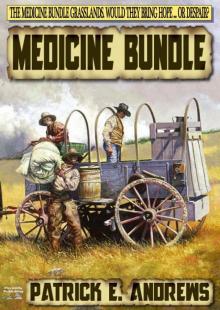 Medicine Bundle
Medicine Bundle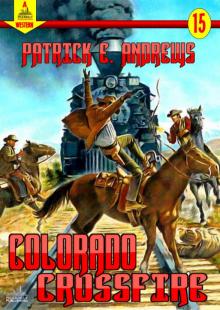 Colorado Crossfire
Colorado Crossfire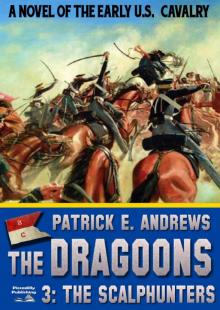 The Dragoons 3
The Dragoons 3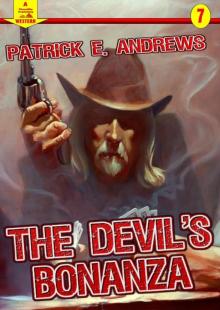 The Devil's Bonanza (A Piccadilly Publishing Western Book
The Devil's Bonanza (A Piccadilly Publishing Western Book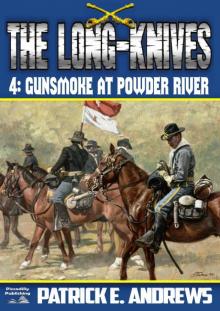 Gunsmoke at Powder River (The Long-Knives #4)
Gunsmoke at Powder River (The Long-Knives #4)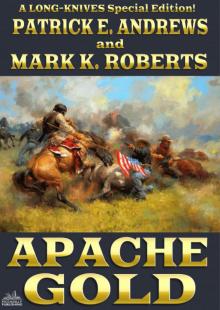 The Long-Knives 6
The Long-Knives 6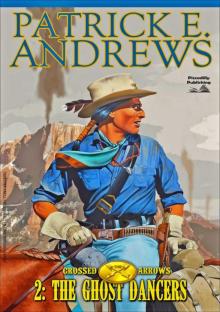 The Ghost Dancers (A Crossed Arrows Western Book 2)
The Ghost Dancers (A Crossed Arrows Western Book 2)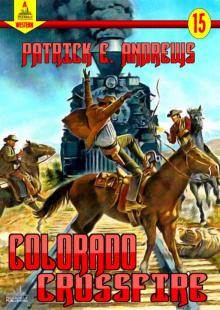 Colorado Crossfire (A Piccadilly Pulishing Western Book 15)
Colorado Crossfire (A Piccadilly Pulishing Western Book 15)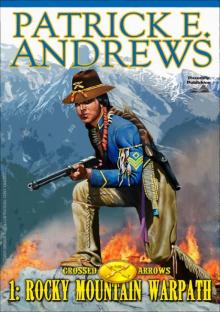 Rocky Mountain Warpath (A Crossed Arrows Western Book 1)
Rocky Mountain Warpath (A Crossed Arrows Western Book 1)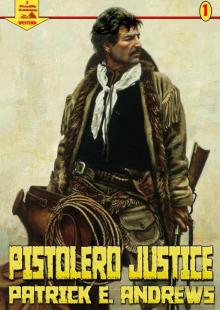 Pistolero Justice (A Piccadilly Publishing Western
Pistolero Justice (A Piccadilly Publishing Western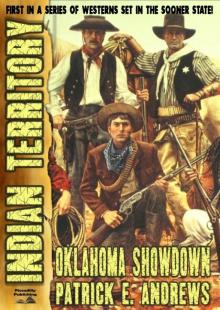 Oklahoma Showdown (An Indian Territory Western Book 1)
Oklahoma Showdown (An Indian Territory Western Book 1)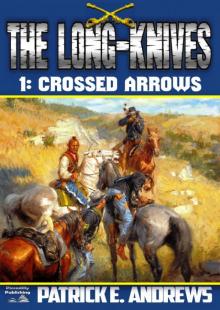 Crossed Arrows (A Long-Knives Western Book 1)
Crossed Arrows (A Long-Knives Western Book 1)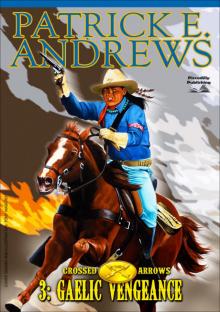 Crossed Arrows 3
Crossed Arrows 3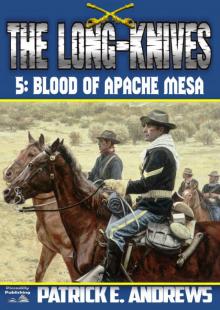 Blood of Apache Mesa
Blood of Apache Mesa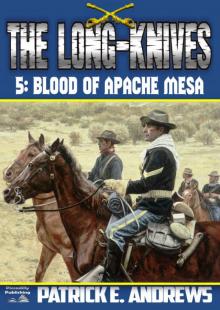 The Long-Knives 5
The Long-Knives 5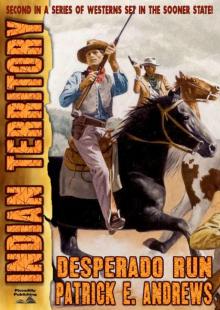 Desperado Run (An Indian Territory Western Book 2)
Desperado Run (An Indian Territory Western Book 2)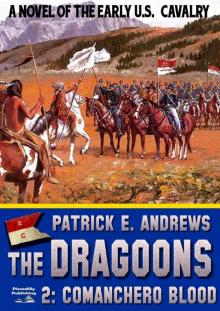 Comanchero Blood (A Dragoons Western Book 2)
Comanchero Blood (A Dragoons Western Book 2)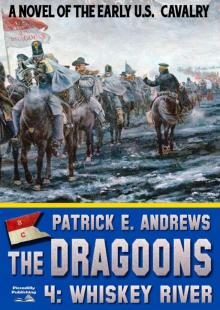 The Dragoons 4
The Dragoons 4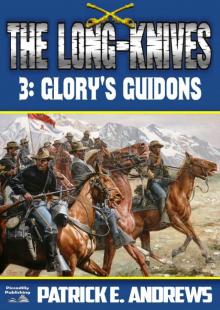 Glory's Guidons (The Long-Knives US Cavalry Western Book 3)
Glory's Guidons (The Long-Knives US Cavalry Western Book 3)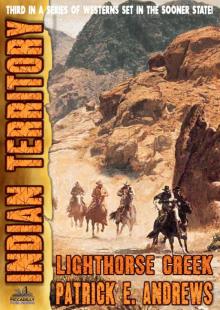 Indian Territory 3
Indian Territory 3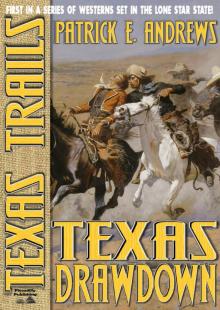 Texas Trails 1
Texas Trails 1